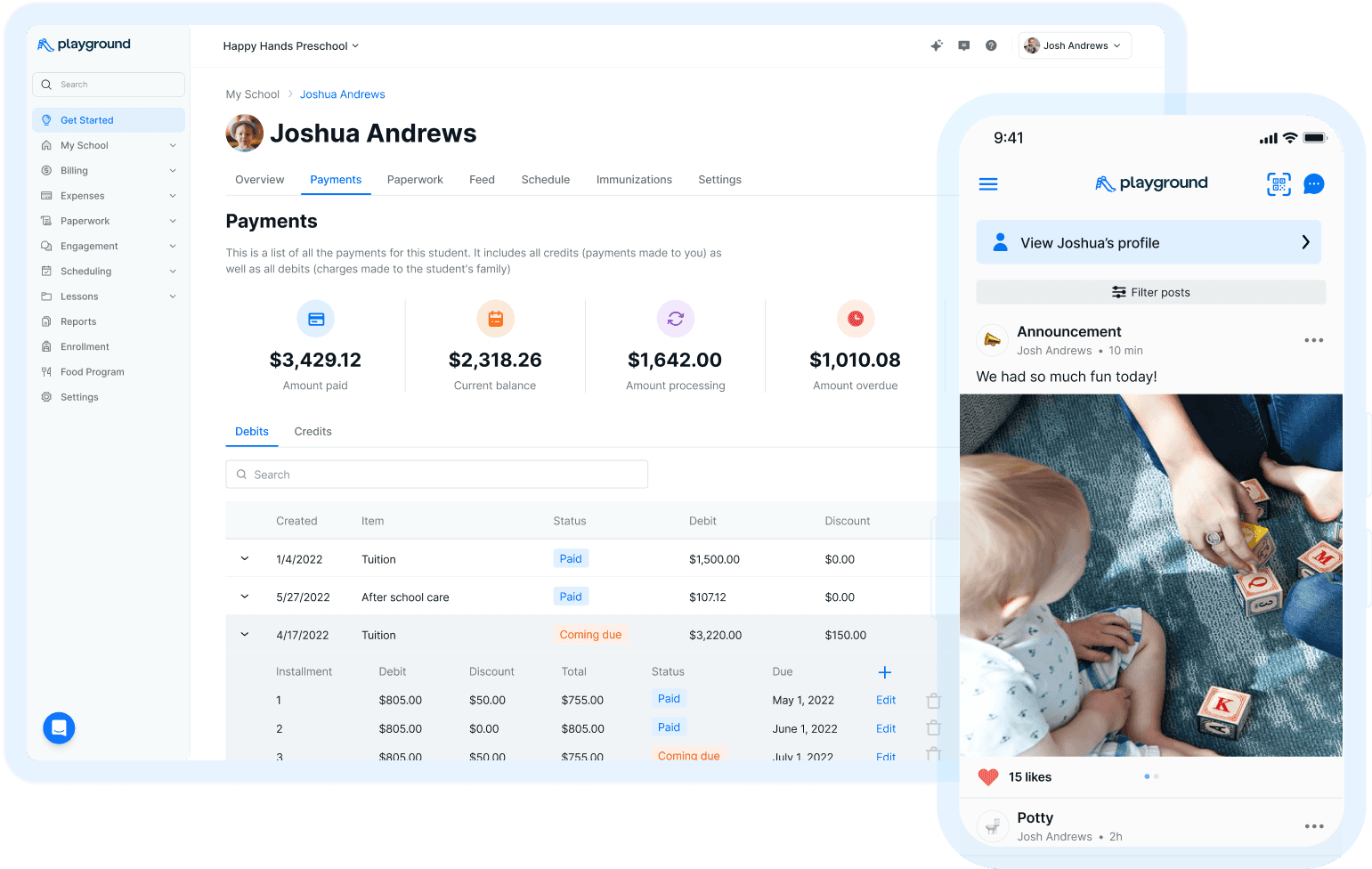Five Key Characteristics for Hiring Early Childhood Staff


Sasha Kopp

Make your families & teachers happier
All-in-one child care management platform with billing, attendance, registration, communication, payroll, and more!
5.0 Rating

Make your families & teachers happier
All-in-one child care management platform with billing, attendance, registration, communication, payroll, and more!
5.0 Rating
Staffing this year has been and continues to be a challenge, to say the least. Many schools and centers lost members of their teams due to health and safety concerns, or because some teachers had to stay home to take care of their own children and family members. As we look towards September, we see that schools are hoping to be back in action at full capacity. However, many schools are still hiring additional teachers to meet their communities’ needs.
Finding staff at this point in the summer is tricky: many experienced teachers have already found work, though many recent college graduates are also entering the workforce. Additionally, there are individuals interested in switching careers and thinking about the possibility of teaching. Hiring at this moment might mean you find staff with less experience, yet the lack of formal education background can hold the potential for great teachers.
Many aspects of being a teacher can be learned on the job and through further professional development opportunities. However, there are many social skills necessary for a teaching role that aren’t necessarily learned in the classroom. Hiring with an emphasis on the following social skills is essential to find the right teacher, regardless of their educational background.
1. Personal warmth
Often, you can feel an individual’s warmth from the second they say hello. Even with masks on, we have learned how to tell when someone is “smiling with their eyes.” We notice it, and children can sense it as well. When finding a new staff member, they must project that warmth – to connect with children, to be present with parents, and to collaborate with co-workers as part of your team.
Sometimes individuals take a bit of time to warm up. That’s okay! Yet if someone you are interviewing seems cold or off-putting they most likely will act that way around children as well. A warm nurturing environment is built around a warm and nurturing staff.
Questions to ask:
-How do your friends describe you?
-Tell me about a relationship you have had with a child in your life.
Remember to be warm yourself and make the applicant feel at home. Even the most nurturing folks can feel anxious in an interview, so try to make it easy for them to show off their strengths.
2. They know that teaching is not all “fun” and “cute”
Often, people are attracted to the field of early childhood because they love kids. They might have younger cousins, or enjoy babysitting, but not have any true classroom experience. Anyone joining the staff of an early childhood or child care program must know that teaching is far more than spending time with cute children all day.
Teachers get to know each child and see all the incredible things that they are capable of. Each day is different, with its own challenges and opportunities. Throughout the year, they get to see children learn, grow, trust and build friendships, while experiencing long days, big feelings, lots of runny noses, and more. It is important to understand that teaching is critically important for children’s development and though it may not be fun every day, it is important and meaningful work.
Questions to ask:
-What do you find exciting about teaching?
-What do you imagine will be the hard parts of the job? How will you handle them?
3. A willingness to pitch in
Teaching can sometimes feel like an all-hands-on-deck activity where you never know what’s coming next. It’s important for any potential hire to know that any work that happens in a classroom can be their responsibility. That could be putting out snacks, washing paint off the floor, or helping a child make it to the bathroom while they are potty training.
Working in a classroom requires making quick decisions and taking action. Applicants who have worked in other fast-paced environments, like restaurants or retail, might have a good sense of what it means to adapt and be a team player. Being able to pitch in is an important skill that might not be listed on a resume, but remains an essential aspect of working with young children.
Questions to ask:
-Tell me about a time you were asked to do something outside your “job description.”
-Has there ever been a time where you have worked in a team? How did you ensure that all tasks got done? Both big and little?
4. They have strong social and emotional intelligence
Having strong social and emotional awareness is critical to work with young children and in a collaborative environment. Young children often communicate their feelings not only through words but also through a variety of other languages, including body language. For example, a child might remove him or herself from a group when they are overwhelmed or upset. It is important for educators to identify these behaviors and help children label their feelings as a way to engage and work together addressing whatever they may be going through.
Educators also are better professionals when they understand their own feelings and can openly and honestly communicate with a co-teacher. Co-teachers need open avenues for honest communication and feedback to support their unique relationship. Having strong social skills is essential to any environment for working with young children; yet, it’s important to remember that there are many different life paths that can lead to one being socially and emotionally aware.
Questions to ask:
-Did you ever have an experience at school or work where an adult noticed and responded to your feelings? What did that look like? How did it affect your experience?
-Share a bit about a time where you worked closely with someone else. What was easy about it? What was challenging?
-What are some ways you relax or unwind?
5. They have their own passions
It’s always fun to ask a candidate about their passions and watch their face light up. Seeing someone’s enthusiasm gives you insight into how they can bring their own passions to the classroom and your school’s culture, adding to their students’ experience and their own.
Veteran yogis can do stretches and mindfulness exercises with their class. Maybe an actor will enjoy singing or doing improv games, those who like building or mechanics can help train future engineers. By hiring people with different backgrounds, you can create a more diverse staff that brings their passions, interests, and expertise to the classroom.
Questions to ask:
-What do you like to do in your free time?
-What’s one of your favorite accomplishments (outside of education)?
Teachers all have different past experiences and career paths that lead them to apply to your job.
Those with high social and emotional intelligence in addition to being warm, passionate, and willing to pitch in make incredible contributions to a teaching team, whether or not they have ever worked in a school setting. Through professional development, mentoring, and experience, a new teacher with the right set of skills for your center can become a master teacher and become a wonderful asset to the community.
Staffing this year has been and continues to be a challenge, to say the least. Many schools and centers lost members of their teams due to health and safety concerns, or because some teachers had to stay home to take care of their own children and family members. As we look towards September, we see that schools are hoping to be back in action at full capacity. However, many schools are still hiring additional teachers to meet their communities’ needs.
Finding staff at this point in the summer is tricky: many experienced teachers have already found work, though many recent college graduates are also entering the workforce. Additionally, there are individuals interested in switching careers and thinking about the possibility of teaching. Hiring at this moment might mean you find staff with less experience, yet the lack of formal education background can hold the potential for great teachers.
Many aspects of being a teacher can be learned on the job and through further professional development opportunities. However, there are many social skills necessary for a teaching role that aren’t necessarily learned in the classroom. Hiring with an emphasis on the following social skills is essential to find the right teacher, regardless of their educational background.
1. Personal warmth
Often, you can feel an individual’s warmth from the second they say hello. Even with masks on, we have learned how to tell when someone is “smiling with their eyes.” We notice it, and children can sense it as well. When finding a new staff member, they must project that warmth – to connect with children, to be present with parents, and to collaborate with co-workers as part of your team.
Sometimes individuals take a bit of time to warm up. That’s okay! Yet if someone you are interviewing seems cold or off-putting they most likely will act that way around children as well. A warm nurturing environment is built around a warm and nurturing staff.
Questions to ask:
-How do your friends describe you?
-Tell me about a relationship you have had with a child in your life.
Remember to be warm yourself and make the applicant feel at home. Even the most nurturing folks can feel anxious in an interview, so try to make it easy for them to show off their strengths.
2. They know that teaching is not all “fun” and “cute”
Often, people are attracted to the field of early childhood because they love kids. They might have younger cousins, or enjoy babysitting, but not have any true classroom experience. Anyone joining the staff of an early childhood or child care program must know that teaching is far more than spending time with cute children all day.
Teachers get to know each child and see all the incredible things that they are capable of. Each day is different, with its own challenges and opportunities. Throughout the year, they get to see children learn, grow, trust and build friendships, while experiencing long days, big feelings, lots of runny noses, and more. It is important to understand that teaching is critically important for children’s development and though it may not be fun every day, it is important and meaningful work.
Questions to ask:
-What do you find exciting about teaching?
-What do you imagine will be the hard parts of the job? How will you handle them?
3. A willingness to pitch in
Teaching can sometimes feel like an all-hands-on-deck activity where you never know what’s coming next. It’s important for any potential hire to know that any work that happens in a classroom can be their responsibility. That could be putting out snacks, washing paint off the floor, or helping a child make it to the bathroom while they are potty training.
Working in a classroom requires making quick decisions and taking action. Applicants who have worked in other fast-paced environments, like restaurants or retail, might have a good sense of what it means to adapt and be a team player. Being able to pitch in is an important skill that might not be listed on a resume, but remains an essential aspect of working with young children.
Questions to ask:
-Tell me about a time you were asked to do something outside your “job description.”
-Has there ever been a time where you have worked in a team? How did you ensure that all tasks got done? Both big and little?
4. They have strong social and emotional intelligence
Having strong social and emotional awareness is critical to work with young children and in a collaborative environment. Young children often communicate their feelings not only through words but also through a variety of other languages, including body language. For example, a child might remove him or herself from a group when they are overwhelmed or upset. It is important for educators to identify these behaviors and help children label their feelings as a way to engage and work together addressing whatever they may be going through.
Educators also are better professionals when they understand their own feelings and can openly and honestly communicate with a co-teacher. Co-teachers need open avenues for honest communication and feedback to support their unique relationship. Having strong social skills is essential to any environment for working with young children; yet, it’s important to remember that there are many different life paths that can lead to one being socially and emotionally aware.
Questions to ask:
-Did you ever have an experience at school or work where an adult noticed and responded to your feelings? What did that look like? How did it affect your experience?
-Share a bit about a time where you worked closely with someone else. What was easy about it? What was challenging?
-What are some ways you relax or unwind?
5. They have their own passions
It’s always fun to ask a candidate about their passions and watch their face light up. Seeing someone’s enthusiasm gives you insight into how they can bring their own passions to the classroom and your school’s culture, adding to their students’ experience and their own.
Veteran yogis can do stretches and mindfulness exercises with their class. Maybe an actor will enjoy singing or doing improv games, those who like building or mechanics can help train future engineers. By hiring people with different backgrounds, you can create a more diverse staff that brings their passions, interests, and expertise to the classroom.
Questions to ask:
-What do you like to do in your free time?
-What’s one of your favorite accomplishments (outside of education)?
Teachers all have different past experiences and career paths that lead them to apply to your job.
Those with high social and emotional intelligence in addition to being warm, passionate, and willing to pitch in make incredible contributions to a teaching team, whether or not they have ever worked in a school setting. Through professional development, mentoring, and experience, a new teacher with the right set of skills for your center can become a master teacher and become a wonderful asset to the community.
Staffing this year has been and continues to be a challenge, to say the least. Many schools and centers lost members of their teams due to health and safety concerns, or because some teachers had to stay home to take care of their own children and family members. As we look towards September, we see that schools are hoping to be back in action at full capacity. However, many schools are still hiring additional teachers to meet their communities’ needs.
Finding staff at this point in the summer is tricky: many experienced teachers have already found work, though many recent college graduates are also entering the workforce. Additionally, there are individuals interested in switching careers and thinking about the possibility of teaching. Hiring at this moment might mean you find staff with less experience, yet the lack of formal education background can hold the potential for great teachers.
Many aspects of being a teacher can be learned on the job and through further professional development opportunities. However, there are many social skills necessary for a teaching role that aren’t necessarily learned in the classroom. Hiring with an emphasis on the following social skills is essential to find the right teacher, regardless of their educational background.
1. Personal warmth
Often, you can feel an individual’s warmth from the second they say hello. Even with masks on, we have learned how to tell when someone is “smiling with their eyes.” We notice it, and children can sense it as well. When finding a new staff member, they must project that warmth – to connect with children, to be present with parents, and to collaborate with co-workers as part of your team.
Sometimes individuals take a bit of time to warm up. That’s okay! Yet if someone you are interviewing seems cold or off-putting they most likely will act that way around children as well. A warm nurturing environment is built around a warm and nurturing staff.
Questions to ask:
-How do your friends describe you?
-Tell me about a relationship you have had with a child in your life.
Remember to be warm yourself and make the applicant feel at home. Even the most nurturing folks can feel anxious in an interview, so try to make it easy for them to show off their strengths.
2. They know that teaching is not all “fun” and “cute”
Often, people are attracted to the field of early childhood because they love kids. They might have younger cousins, or enjoy babysitting, but not have any true classroom experience. Anyone joining the staff of an early childhood or child care program must know that teaching is far more than spending time with cute children all day.
Teachers get to know each child and see all the incredible things that they are capable of. Each day is different, with its own challenges and opportunities. Throughout the year, they get to see children learn, grow, trust and build friendships, while experiencing long days, big feelings, lots of runny noses, and more. It is important to understand that teaching is critically important for children’s development and though it may not be fun every day, it is important and meaningful work.
Questions to ask:
-What do you find exciting about teaching?
-What do you imagine will be the hard parts of the job? How will you handle them?
3. A willingness to pitch in
Teaching can sometimes feel like an all-hands-on-deck activity where you never know what’s coming next. It’s important for any potential hire to know that any work that happens in a classroom can be their responsibility. That could be putting out snacks, washing paint off the floor, or helping a child make it to the bathroom while they are potty training.
Working in a classroom requires making quick decisions and taking action. Applicants who have worked in other fast-paced environments, like restaurants or retail, might have a good sense of what it means to adapt and be a team player. Being able to pitch in is an important skill that might not be listed on a resume, but remains an essential aspect of working with young children.
Questions to ask:
-Tell me about a time you were asked to do something outside your “job description.”
-Has there ever been a time where you have worked in a team? How did you ensure that all tasks got done? Both big and little?
4. They have strong social and emotional intelligence
Having strong social and emotional awareness is critical to work with young children and in a collaborative environment. Young children often communicate their feelings not only through words but also through a variety of other languages, including body language. For example, a child might remove him or herself from a group when they are overwhelmed or upset. It is important for educators to identify these behaviors and help children label their feelings as a way to engage and work together addressing whatever they may be going through.
Educators also are better professionals when they understand their own feelings and can openly and honestly communicate with a co-teacher. Co-teachers need open avenues for honest communication and feedback to support their unique relationship. Having strong social skills is essential to any environment for working with young children; yet, it’s important to remember that there are many different life paths that can lead to one being socially and emotionally aware.
Questions to ask:
-Did you ever have an experience at school or work where an adult noticed and responded to your feelings? What did that look like? How did it affect your experience?
-Share a bit about a time where you worked closely with someone else. What was easy about it? What was challenging?
-What are some ways you relax or unwind?
5. They have their own passions
It’s always fun to ask a candidate about their passions and watch their face light up. Seeing someone’s enthusiasm gives you insight into how they can bring their own passions to the classroom and your school’s culture, adding to their students’ experience and their own.
Veteran yogis can do stretches and mindfulness exercises with their class. Maybe an actor will enjoy singing or doing improv games, those who like building or mechanics can help train future engineers. By hiring people with different backgrounds, you can create a more diverse staff that brings their passions, interests, and expertise to the classroom.
Questions to ask:
-What do you like to do in your free time?
-What’s one of your favorite accomplishments (outside of education)?
Teachers all have different past experiences and career paths that lead them to apply to your job.
Those with high social and emotional intelligence in addition to being warm, passionate, and willing to pitch in make incredible contributions to a teaching team, whether or not they have ever worked in a school setting. Through professional development, mentoring, and experience, a new teacher with the right set of skills for your center can become a master teacher and become a wonderful asset to the community.
Playground is the only app directors need to run their early child care center. Playground manages billing, attendance, registration, communication, paperwork, reporting, and more for child care programs. 100,000+ directors, teachers, and families trust Playground to simplify their lives.
Learn more by scheduling a free personalized demo.
See what Playground can do for you
Learn how our top-rated child care management platform can make your families & teachers happier while lowering your costs



Explore more
Stay in the loop.
Sign up for Playground updates.
Stay in the loop.
Sign up for Playground updates.
Stay in the loop.
Sign up for the updates.
© 2024 Carline Inc. All rights reserved.

© 2024 Carline Inc. All rights reserved.

© 2024 Carline Inc. All rights reserved.

Five Key Characteristics for Hiring Early Childhood Staff
Published Dec 8, 2021
|




